| As I was spending the New Year’s Eve in the Dogon Country, I learnt that not all villages would celebrate the coming of the new year. Kani-Kombole, where I was staying wasn’t planning to do anything due to a lack of funds. I was determined to change that. |
 |
|
I descended the Biandiagara Escarpment when giant baobabs and frail mud-brick structures began casting long afternoon shadows. I quickly got myself organised and started climbing back the cliffs looking for the remains of the history of the local tribes. My 15 year-old Dogon guide told me this story:
Once upon a time, two brothers travelled across the country struggling to find food. They couldn’t find animals to hunt. They walked for weeks. The little brother tired and very hungry rested in a shade of a great big baobab tree. He no longer had strength to carry on. The big brother, who loved his little brother so much, promised him to find food and went away looking for luck in the woods. He was gone for a long time but he couldn’t find any animals. When he returned to the baobab tree, his baby brother cried and said that couldn’t continue travelling, because he was too weak. The big brother replied that he would try again to hunt something and once more he went away. But he had no luck. He was desperate and didn’t known what to do. He decided to cut some flesh off his leg and tell his little brother that he’d hunted something. When he returned to the baobab tree, the little brother was very happy. They cooked the flesh and ate it. The little brother brought to his strength said he was ready to continue, but the big brother couldn’t go on because of his wound. The little brother convinced to continue his journey on his own, left his big brother under the baobab tree, but didn’t know in which direction to go and lost his way. He sat down in the desert and cried. Suddenly, a snake came and showed him to the Bandiagara Escarpment. The little brother settled there and the Dogon people emerged in the region.
In the meantime, people from the Bozo tribe found the big brother and took him with them. They adopted him and he became their brother. This is why the Dogon and the Bozo are brothers and cousins. They love each other and never fight but they also never intermarry.
|
|
| Favourite spots: |
 |
 |
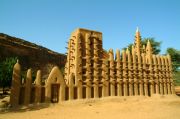 |
 |
 |
 |
 |
 |
Kani-Kombole mud-brick mosque
 |
 |
I loved this story. He told it in a very simple language but with so much passion and emotion that it was hard for him to contain. He was just a local boy from Kani-Kombole, who was designated by the chief of the village to take me around.
The village itself was complete with a lovely little mud mosque, baobab garden and greatly photogenic Dogon typical granaries. My guide was very polite and answered all of my 1001 questions. And one of the questions were about the New Year’s Eve party. I was hoping for a lot of singing and dancing in colourful costumes and masks. Sadly, I found that Kani-Kombole planned to take it easy by going to bed early. The reason was that the villagers were too poor to afford a party. I asked whether things would change if I bought a sheep, we slaughtered it and had a party. He told me that the entire village would love me for that. Not only would they make some money from the sale but would share the food and even would feel better that I enjoyed my stay.
|
|
| What's really great: |
 |
 |
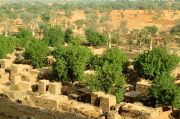 |
 |
 |
 |
 |
 |
Kani-Kombole, view from the cliffs
 |
 |
I decided to buy a sheep for €35. I asked if it’d be big enough for the boy guide, my other Dogon guide, my driver and the family with whom I was staying. For an extra €5 I could get a larger animal, and the entire village would get some. It was a no-brainer! Unfortunately, in that case I had to be involved in the skinning process! Well, it wasn’t as bad as I imagined and I had an opportunity to meet half of the village. Then, I just had to wait. The sun had set and darkness fell upon Kani-Kombole. The villagers kept the cooking process central and I just sat down with a few locals at the ‘hotel’ and killed time trying to communicate with everyone. At best, we could converse in French. If only I could really speak French! With a very limited vocabulary and non-existent grammar it was a challenge for me. It was as big as some of the Dogons’, who didn’t speak French at all. It was fun! When the food arrived we all partied in the candlelight. I’ve never had more tender lamb in my life!
|
|
| Sights: |
 |
 |
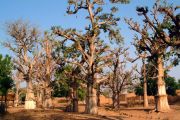 |
 |
 |
 |
 |
 |
Kani-Kombole, baobab garden hiding mud-bricks productions floor
 |
 |
The difficulty of hiking in the Dogon Country is massively exaggerated. It’s actually very possible in one, easy day to hike from Kani-Kombole all the way to Dioundiourou and making a lunch stop in Ennde or Teli. It took me just 90 minutes, at a very easy pace, to hike from Kanikombole to Ennde in one afternoon. The very next morning, I made a hike from Ennde to Yabatalou and back in just 140 minutes, stopping on the way at Bagourou to take pictures.
I am convinced that in 3 easy days, one can make a trek from Kanikombole to Tireli and in 4, to Banani. The villages look the same, and after 3 days, it gets a bit uninteresting to pass by the same Dogon or Pygmy architecture. Occasionally, it is interesting to climb parts of the escarpment to have a closer look at the tiny Pygmy households, which are now mostly abandoned. The Dogons however, have assumed the responsibility to take care of the huts and keep them in good condition, as promised to the Pygmies, who occasionally come to visit.
|
|
| Accommodations: |
 |
 |
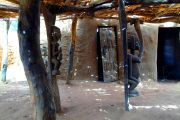 |
 |
 |
 |
 |
 |
Dogon's village chief's house - shaded space designed for congregations, meetings, discussions...
 |
 |
The first night spent in Kani-Kombole was with a family who ran some sort of a campament (€1.5 + a few kola nuts), which offered nice shaded area and Spartan rooms with bare, mud floor and no windows. But the best way of spending the night is on the roof, under the cover of the billions of stars. It’s a very popular way practised by both the locals and the travellers.
In the Dogon country, the shower is nothing else but a bucket of cold water served with a cup to pour smaller amounts of water on oneself, in a mud brick cabin without a roof. The same system is applied to a toilet, but usually a different hole in the ground is used for that.
For me it was a great experience and the scenery facilitated the ambiance, but the hole in the floor serving as a toilet with no door or light in the night was fun for once or twice. There was just too much stress, that whilst you were taking your perfect ‘number two’, someone could enter the utility as well without you even noticing!
|
|
| Nightlife: |
 |
 |
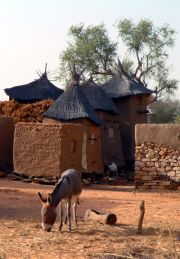 |
 |
 |
 |
 |
 |
Ennde - granaries at the back and the donkey, the main workforce and transport in the country
 |
 |
A couple of hours before the end of the year, a local guy said that there was a big party in Ennde and that I should go. Ali, my driver, wanted to go by a chariot. But we couldn’t, because the donkey was asleep. So, Ali insisted to take his Peugeot 505 car, which miraculously didn’t break on the sand in the dark!
In Ennde, there was drumming and dancing until wee hours of the New Year Day. I was soaking the atmosphere and although I couldn’t entirely understand the rituals, I was jumping along to the rhythm of the drums. Kids were dancing with very impressive skill, passion and attitude. These were mainly boys, who couldn’t be older than six. Many of the artists and people wore traditional costumes for the dancing and the spectacle but the majority of them had Nike and Adidas t-shirts underneath! It was special. The traditional clothes were made of wood and metal, sometimes of grass and mud, so the 21st century cotton shirts were a special spice and addition to the merriment.
|
|
| Hangouts: |
 |
 |
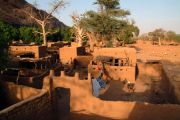 |
 |
 |
 |
 |
 |
Ennde, view from the roof of the chief's house
 |
 |
Ennde, although similar to all of the villages I saw, was unique. It was split into three districts, each had its name that followed a hyphen and the word ‘Ennde’. I loved sitting on the roof of the chief’s house and watch life going on in the village, people stirring about. Particularly early in the morning. Life didn’t look that hard from the top of the roof. Everything seemed to have its order, its place in the everyday pattern. But if that was enough of hanging out in the sun, the campament of the village was very well organised. It had a very pleasant shaded garden, complete with a number of large, electric (!) refrigerators, from which they sold cold drinks, including beer in large bottles. It was the closest thing to a bar (and it looked like a pleasant place to stay for the night, by the way) and a great spot to talk to travellers. It was superb to be mingling with both the Dogons, other Malian tribes visiting, and foreigners after the drumming and dancing ended.
|
|
| Restaurants: |
 |
 |
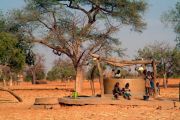 |
 |
 |
 |
 |
 |
Dogon children at the well, collecting water and playing
 |
 |
At the time I visited the Bandiagara Escarpment there were no restaurants anywhere in the lower villages. The campaments often offered very basic meals (€0.5) and the villages frequently visited by tourists ran small shops with basic food stuffs, sweets and biscuits. So, I was lucky to have bought a sheep, as this was probably of the tastiest meals ever. I never had mutton so good before in my life, and apart from fish, I have never eaten an animal that was alive less than two hours before my meal. The first dish was mutton in very surprising and spicy sauce, which nearly caused me impossible to describe symphony of shivers and incredible sensation in my taste buds. It was the closest thing to heaven. I thought I was dreaming. The meat was so tender that it was simply dissolving in my mouth. There was also a second dish with equally delicious meat but in a slightly different sauce. Then, came the very Malian style smoked meat, which was very different than anything I had eaten before.
|
|
| Other recommendations: |
 |
 |
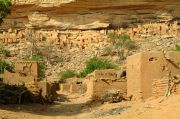 |
 |
 |
 |
 |
 |
Teli n/ Kani-Kombole; houses & granaries in the front, Pygmy huts clinging to the cliff at the back
 |
 |
There are parts of the Dogon Country where ancient animist laws operate with human sacrifice not being rare. It’s dangerous to venture in those areas and even the Dogons from other parts (Muslim or Christian) don’t go there. Dogon guides are essential! (€ negotiate)
The night sky in the country bewildered me. By 10:30 pm, the night was completely moonless. The sky was clear that it seriously hypnotised me. And I’m not joking! There were so many stars in the sky that I couldn’t distinguish the star constellations. It looked like an alien sky, not from this planet. It was actually scary, because I was completely sober and I knew that this shouldn’t be happening to me, because I was in Africa before and I should know this super clear sky phenomenon from before. However, I was extremely overwhelmed with the firmament. That it wasn’t normal. I cannot describe it! It felt like I was on a strange planet that didn’t have a layer of an atmosphere and that I was actually in the bare Space.
|
|
Published on Wednesday April 16th, 2008
|
|
 Publish on Facebook
Publish on Facebook
|
Sat, May 10 2008 - 02:03 AM
 by marianne
| Another perfect report, not only perfect also interesting |
Fri, Apr 25 2008 - 01:00 AM
 by jorgesanchez by jorgesanchez
| Another obra de arte report! |
Wed, Apr 16 2008 - 02:19 PM
 by rangutan by rangutan
| Gosh! You describe Africa so well. For those not having being there; beyond all imagination unless they read this! [4.8] |
| Information: |
| Login if you are a member, or sign up for a free membership to rate this report and to earn globo points! |
|
| Serbia |
|
|
 |
| Seychelles |
|
|
 |
| Sierra Leone |
|
|
 |
| Singapore |
|
|
 |
| Slovakia |
|
|
 |
| Somalia |
|
|
 |
| South Africa |
|
|
 |
| Spain |
|
|
 |
| St. Lucia |
|
|
 |
| St. Martin |
|
|
 |
| Suriname |
|
|
 |
| Swaziland |
|
|
 |
| Sweden |
|
|
 |
| Switzerland |
|
|
|
|
|

|
